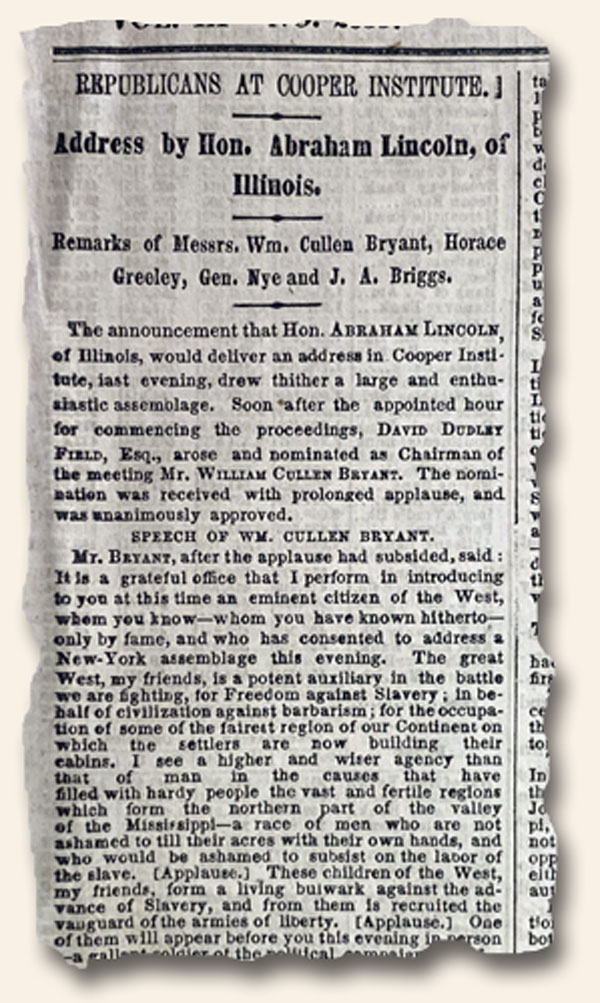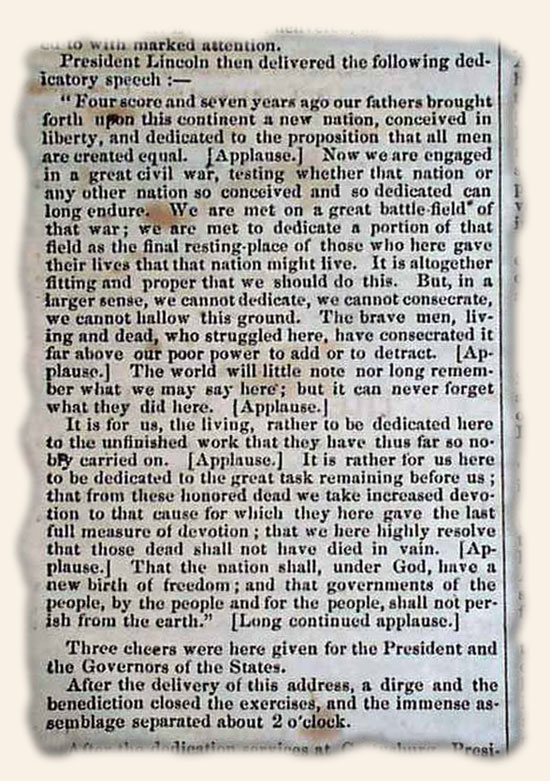A Fly on the Wall at Lincoln’s Cooper Union Speech…
March 11, 2021 by Laura Heilenman · Leave a Comment
How often have we all said, “I wish I could have been a fly on the wall.”? This week, as I helped a customer with an order, I was struck again with how often that statement is uttered here in our RareNewspapers office. This gentleman was beside himself over an issue we had obtained covering Abraham Lincoln’s Cooper Speech (see image below). Hearing him excitedly describe the content soon grabbed my imagination as well. As I finished his order and set the phone back into the cradle, I dug in to find any additional issues we may might still have highlighting this historic speech. Reading aloud (yet quietly to myself), I was transported to the scene. Follow me for a few moments to this history defining moment in time, picking up at the end of William Cullen Bryant’s (American poet & editor of the NEW YORK EVENING POST) introduction of this great American Hero…
“‘I have only to pronounce his name to secure your profoundest attention’ [Prolonged applause, and cheers for Lincoln]. Mr. Lincoln advanced to the desk, and smiling graciously upon his audience, complacently awaited the termination of the cheering and then proceeded with his address as follows…”. What followed was the speech that triggered Lincoln’s famous quote: “Another Republican Orator on the Stump.”
So many current phrases could be used to describe this moment in time: “A Star is Born”, “For Such a Time as This”… but for me, all I could think of was, “I wish I could have been a fly on the wall”, and I’m so grateful to the THE NEW YORK TIMES reporter who helped me to be one on February 28, 1860.
For United We Stand…
December 8, 2014 by GuyHeilenman · Leave a Comment
“And if a house is divided against itself, that house will not be able to stand.”
(God, as written by Mark in Mark 3:25)
“United we stand, divided we fall.”
(Aesop)
“A house divided against itself cannot stand.”
(Abraham Lincoln)
“For united we stand; Divided we fall. And if our backs should ever be against the wall. We’ll be together…”
(The Brotherhood of Man)
Bringing people together is no small task. Those who have the ability to rally factions behind a common cause are few and far between. Those who can do so for a noble cause are a true rarity.
While we all acknowledge Abraham Lincoln’s efforts to this end as exemplified in both his “House Divided” speech and yet again in his “Gettysburg Address”, it was another relatively unknown true American patriot who was instrumental in doing the same soon after the close of the American Revolutionary War: Dr. Benjamin Rush. Below please find (and enjoy) the full text of “Address to the People of the United States”, which begins:
“There is nothing more common that to confound the terms of the American revolution with those of the late American war. The American war is over; but this is far from being the case with the American revolution.”,
and concludes:
“PATRIOTS of 1774, 1775, 1778—HEROES of 1778, 1779, 1780! come forward! your country demands your services!—Philosophers and friends to mankind, com forward! your country demands your studies and speculations! Lovers of peace and order, who declined taking part in the late war, come forward! your country forgives your timidity, and demands your influence and advice! Hear her proclaiming, in sighs and groans, in her governments, in her finances, in her trade, in her manufactures, in her morals, and in her manners, ‘THE REVOLUTION IS NOT OVER!’ “, Dr. Benjamin Rush, MD.
What a tremendous rally for all Americans to unite behind a noble cause: the establishment of a nation like none other!
To read the complete text of this amazing speech, go to: American Museum, January, 1787
The Gettysburg Address… What did he actually say?
November 19, 2013 by GuyHeilenman · 1 Comment
“Four score and seven years ago…”
150 years ago this month, President Abraham Lincoln delivered what we now consider to be one of the greatest speeches of all time. Interestingly enough, since 5 different manuscripts exist, there is some disagreement amongst historians concerning what he actually said. Might original newspapers of the day with eye witness accounts provide the answer? If the speech had been long we probably wouldn’t have a high degree of confidence in the newspaper reporters’ accounts, but the brevity of the speech certainly increases the probability of an accurate transcription. Original reports may not have the definitive answer to this question, but they certainly provide reasonable evidence regarding what was actually spoken. Once again, “History is never more fascinating than when it is read from the day it was first reported.“
View Authentic Newspapers with Gettysburg Address Coverage


